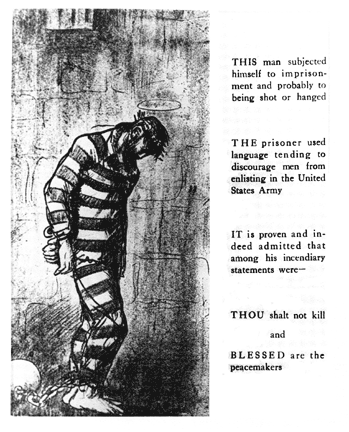One of the first victims of nearly every American war is the First Amendment, which guarantees civil liberties encompassing some of our most essential democratic freedoms. The Espionage Act of 1917 and the Sedition Act of 1918 temporarily trumped Americans' rights to religious freedom and to freely speak, publish, or petition the government.
Acts to Control Liberties
The Espionage Act made it a crime to pass information with the intent of harming the success of American armed forces. To shore up the Espionage Act, Congress followed with the Sedition Act, which expressly prohibited speaking, writing or publishing anything against the federal government and the war effort of the U.S. or its allies. This wide characterization of crimes included activities such as inciting insubordination, disloyalty or mutiny, refusal to serve in the armed forces, or interfering with military recruitment operations. Those convicted generally received prison sentences of five to 20 years. The acts applied only to times "when the United States is in war" and, following the cessation of hostilities in November 1919, the legislation was repealed on December 13, 1920.
Passing the Acts
Wartime violence on the part of vigilantes, whether individual citizens or mobs, persuaded some lawmakers that laws protecting public order were inadequate. In their view, the public was making its own attempts to punish unpopular speech due to the government's unwillingness or inability to do so. Enhancing federal authority under the Espionage Act, followed by the Sedition Act, was therefore necessary to prevent mobs from doing what the government could not.
President Wilson and his Attorney General, Thomas Watts Gregory, viewed the legislation as a political compromise. They hoped to avoid hearings that would embarrass the administration for its failure to prosecute offensive speech, but also feared proposals that would move prosecutorial authority from the Justice Department to the War Department, creating a form of civilian court-martial saddled with questionable constitutionality.
The acts met considerable opposition in the Senate, almost entirely from Republicans like Henry Cabot Lodge and Hiram Johnson, the former defending free speech and the latter assailing the administration for failing to use laws already in place. Republican former President Theodore Roosevelt voiced opposition as well.
Enforcing the Acts
Attorney General Thomas Gregory instructed Postmaster General Albert Burleson to censure and, if necessary, discontinue delivery of anti-American or pro-German mailings including letters, magazines and newspapers. The postal service followed this directive through a nationwide network of censuring officials, such as the New York City postmaster, who refused to mail "The Masses", a socialist monthly, citing the publication's "general tenor." For the most part, however, enforcement was left to the discretion of local United States attorneys and action varied widely.

"Blessed are the Peacemakers"
"Blessed are the Peacemakers" by George Bellows. This anti-war cartoon depicts Jesus with a halo in prison stripes alongside a list of his seditious crimes. It was first published in "The Masses" in 1917.
Vigilantism and Repression
Police and judicial action, private vigilante groups, and public hysteria compromised the civil liberties of many Americans who disagreed with Wilson's war policies. Attorney General Gregory supported the work of the American Protective League (APL), which was one of the many patriotic associations that sprang up to support the war and, in coordination with the Federal Bureau of Investigation, identify anti-war organizations and those it deemed slackers, spies or draft dodgers. The APL curbed dissent at home by compelling German-Americans to sign a pledge of allegiance, as well as conducting extra-governmental surveillance on pro-German activities and organizations such as unions. In a July 1917 speech, Max Eastman complained that the government's ongoing aggressive prosecutions of dissent meant, "You can't even collect your thoughts without getting arrested for unlawful assemblage."
Prosecutions under the Acts
Famed labor movement leader Eugene V. Debs, the Socialist Party presidential candidate in 1904, 1908 and 1912, was arrested in June 1918 for making a speech in Canton, Ohio, denouncing military conscription and urging listeners not to take part in the draft. Charged with ten counts of sedition, Debs defended himself eloquently but was found guilty and sentenced on November 18, 1918 – exactly one week after an armistice ended the fighting in Europe – to 10 years in prison and loss of his right to vote for life. Despite his own electoral disenfranchisement, he ran for president again in 1920 from prison before his sentence was commuted in 1921.
In United States v. Motion Picture Film (1917), a federal court upheld the government's seizure of a 1917 movie, The Spirit of '76, on the grounds that its depiction of cruelty by British soldiers during the American Revolution would undermine support for America's wartime ally. The film’s writer and producer, Robert Goldstein, was prosecuted under the Espionage Act and received a 10-year prison sentence and $5,000 fine, which was commuted to three years upon appeal.
The End of the Acts
The U.S. Supreme Court upheld the Espionage and Sedition Acts in the 1919 case, Abrams v. United States, although Justice Oliver Wendell Holmes used his dissenting opinion to comment on what came to be known as "the marketplace of ideas", a theory that suggests only minimal government regulation of speech and expression is necessary because ideas will succeed or fail on their own merit in the same way a discerning consumer marketplace will eventually eliminate bad products. Congress repealed the Sedition Act on December 13, 1920, although those convicted under the law continued to serve their prison terms. Subsequent Supreme Court decisions, such as Brandenburg v. Ohio in 1969, make it unlikely that similar legislation restricting civil liberties would be considered constitutional today.